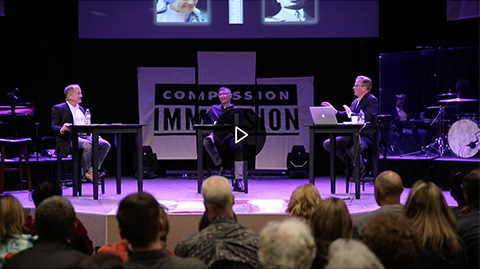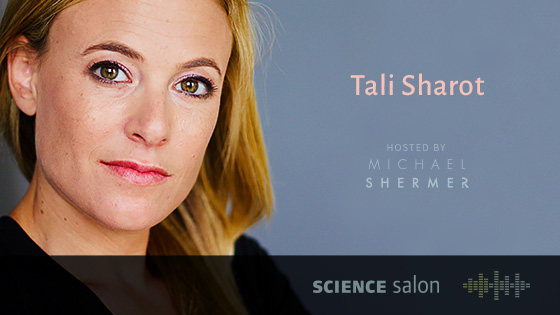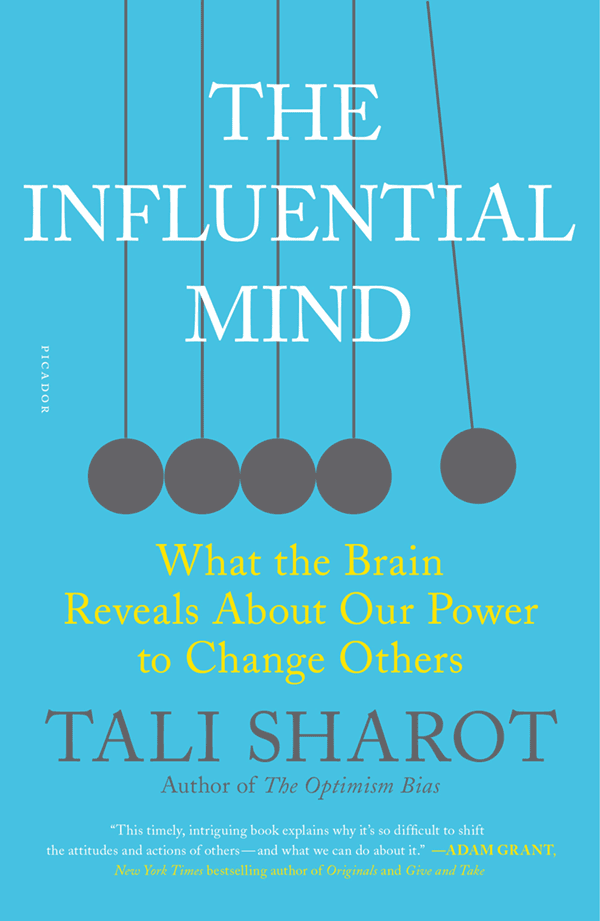SCIENCE SALON # 35
Dr. Tali Sharot — The Influential Mind: What the Brain Reveals About Our Power to Change Others
In her new book, The Influential Mind, neuroscientist Tali Sharot takes readers on a thrilling exploration of the nature of influence, so she and Shermer start the conversation by discussing how we can influence, for example, climate deniers to accept climate science, anti-vaxxers to accept vaccines, and creationists to accept evolution. As Sharot shows in her research, merely presenting people with the facts will not change their minds. There are other forces at work, which she reveals in this conversation and in more depth in her book. It turns out, for example, that many of our instincts—from relying on facts and figures to shape opinions, to insisting others are wrong or attempting to exert control—are ineffective, because they are incompatible with how people’s minds operate. Sharot shows us how to avoid these pitfalls, and how an attempt to change beliefs and actions is successful when it is well-matched with the core elements that govern the human brain. Sharot reveals the critical role of emotion in influence, the weakness of data and the power of curiosity. Relying on the latest research in neuroscience, behavioral economics and psychology, she provides fascinating insight into the complex power of influence, good and bad. Since she grew up in Israel, she and Shermer discuss the role of religion in terrorism and politics along with health and happiness.
Tali Sharot is a Professor of cognitive Neuroscience at University College London where she directs the Affective Brain Lab. She combines research in psychology, behavioural economics and neuroscience to reveal the forces that shape our decisions and beliefs. Dr. Sharot is the author of The Influential Mind and The Optimism Bias. Her papers have been published in top scientific journals including Nature, Science and Nature Neuroscience. This work has been the subject of features in many outlets including the New York Times, the Washington Post, CNN, the BBC and others. She has also written essays for Time (cover story), the New York Times, the Guardian among others. She was a speaker at TED’s annual conference 2012 and a British Academy and Wellcome Trust fellow. She received her Ph.D from New York University.
Listen to the podcast via Apple Podcasts, Spotify, Google Play Music, Stitcher, iHeartRadio, and TuneIn.
This remote Science Salon was recorded on August 17, 2018.
Check Us Out On YouTube.
Science Salons • Michael Shermer
Skeptic Presents • All Videos
If you enjoy the video, audio, and written content we produce, please show your support by making a donation. Your ongoing patronage is vital to our organization’s mission to promote science and critical thinking.
MISSED THE NATURE OF REALITY DEBATE?
Watch Shermer vs. Turek now
Does belief in God make sense of the world? Or does reality itself point to God’s absence? Is God real or is he a product of human minds? On August 24, 2018, Michael Shermer and Frank Turek debated the question: “What better explains reality: Atheism or Theism?” If you missed the debate, you can watch it now for free.
Download a PDF of Shermer’s talking points from the debate.

The PowerPoint slide in this image is Frank Turek’s in which he made the argument that without God there’s no difference between Hitler and Mother Teresa, and that child molestation is not objectively wrong. Shermer’s response to Turek: “You can’t think of any reasons why molesting children is wrong?” Download a PDF of Michael Shermer’s talking points from the debate.
MONSTERTALK EPISODE 166
Chained Heir: Gothic Horror in Glamis Castle
Glamis Castle has secrets—and one of them is monstrous. Mike Dash (Spring Heeled Jack) joins us to talk about his research into the dark folklore around this ancient, beautiful household.
Get the MonsterTalk Podcast App and enjoy the science show about monsters on your handheld devices! Available for iOS, Android, and Windows. Subscribe to MonsterTalk for free on iTunes.
PURCHASE WITH PURPOSE!
Shop AmazonSmile for Back to School
Amazon donates to Skeptics Society when you shop for back to school supplies at smile.amazon.com.














